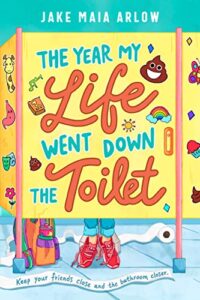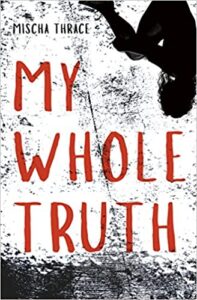Buy this from Bookshop.org to support local bookstores and the Lesbrary!
And you think you have a lot of crap to deal with!
The Year My Life Went Down the Toilet by Jake Maia Arlow is the story of twelve-year-old Al Schneider, whose life is moving at far too fast a pace—and so are her intestines. She’s not sure if and how to explain that she likes girls. Her mom barely seems to notice anything but her digestive challenges. Her best and only friend, Leo, wants to join drama club and leave her behind. All of which she needs to address between runs to the bathroom thanks to her Crohn’s disease.
When it comes to depicting Crohn’s disease, Arlow, much like an afflicted sphincter, doesn’t hold back. And I love that. Disability is hard, and bowel-related disabilities have a particular challenge thanks to their symptoms being very little-discussed. We don’t discuss poop, as a society. People with IBD don’t have a choice, and the book doesn’t sugar-coat that. (Sugar-coated poop is… somehow considerably worse.) But jokes aside, I appreciated that the book honestly addressed everything from farts to colostomy bags to pooping yourself in gym class, and it did so with empathy and respect.
At the same time, autonomy and identity merge well as themes with regard to both Al’s disability and her sexuality. She feels validated when her middle school IBD meeting offers different snacks to suit digestive needs; she feels frustrated when her mom chooses the same stomach-safe foods over and over. Al does need accommodations. She also deserves to make choices about her own body. So it makes sense that someone who is figuring things about herself and very much wants more autonomy would be hesitant to come out.
That was another aspect of the book I liked. Al knows she won’t face homophobia when she comes out to her mom, who is bisexual and has a girlfriend. It’s not about fear but identity: she doesn’t want to be seen as “copying” when she’s just being herself. I enjoyed the exploration of why someone might keep that private for reasons besides fear.
In fact, the book features plenty of queer joy. Al’s IBD middle school support group consists entirely of queer kids. She feels right at home among them, and especially with cute girl Mina. Al and Mina’s relationship reminded me a lot of a relationship I once had with another disabled person (mentioned here with permission). There were experiences we shared as disabled people and things we innately understood about one another—which is not to say non-disabled people can’t do that, they absolutely can, but they often don’t. I felt so validated by the comfort and companionship Al and Mina found with each other.
Now, this is not to say that the book is perfect. Conflicts came to convenient resolutions, but that made its own sort of sense. Al is isolated by her disability and it has impacted her social development. She is caring but also thoughtless, not the most empathetic person by a far cry. She needs to hear other people’s perspectives, and they need to see that she cares. I also would have liked to see more about Al’s questions about gender identity, which are raised early on but largely abandoned.
Is The Year My Life Went Down the Toilet perfect? No. But it is engaging, honest, sweet, and hilarious. A more than worthy addition to the annals of sapphic middle grade fiction!



